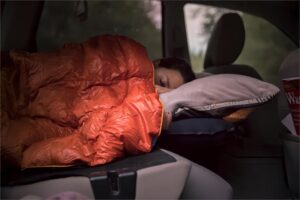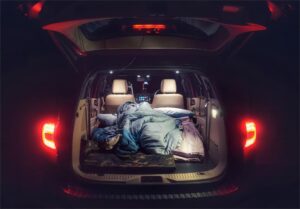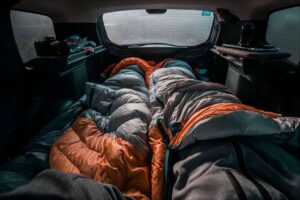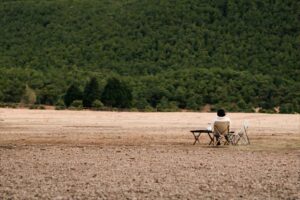
But as always danger can be lurking from every direction. From campsite selection and food to sleeping arrangements. You never know what threats may come your way and in what form. When the weather changes, hunger hits, or vermin attack, you never know what your family may face. You must have a strategy for everything. To make vehicle camping more fun, we have listed all of the potential risks you may face, so you can keep them in mind and be cautious while planning your journey.
Is car camping dangerous?
If we had to provide a definitive response to this issue, we would reply that no, car camping is not harmful. However, car camping is only safe if you know what you’re doing and avoid taking unnecessary risks. These concerns are mostly associated with sleeping in public locations that are not conducive to car camping, yet many individuals nevertheless choose to do so since it is more convenient and less expensive than visiting campsites. We’ve compiled a list of the most prevalent camping hazards, as well as a summary of the risks associated with automobile camping in public locations. If you’re new to car camping, we recommend reading our guide.
Dangers of car camping
Campfires
Keep your campfire a safe distance from your tent. Although most tents are made of flame-resistant materials, it doesn’t mean they’re impenetrable.
It is vital to correctly construct your fire to prevent it from spreading and burning out of control – not just for your own safety, but also for the forest’s protection. Forest fires should be avoided at all costs. That alone is why many regions prohibit open campfires. Use stones to form a non-flammable barrier around your fire, and keep everything flammables, including free-flying papers and dry leaves, away from it.
Carbon Monoxide Poisoning
Carbon monoxide poisoning is known as a silent killer since it is odorless and there is no immediate way to know you’re being exposed to it if you don’t have a detector.
To avoid carbon monoxide poisoning, place all wood and gas-burning items outside your tent. Campers may also be exposed to this dangerous chemical. Some waterproof tents are quite good at keeping the rain out, but they can also trap carbon monoxide since there is little to no air circulation within the tent. Some camping stoves emit deadly amounts of carbon monoxide after just 20 minutes, which can become trapped in certain types of tents. The easiest technique to prevent carbon monoxide poisoning when camping is to keep burners and grills outside of your tent and away from your shelter. If you intend to heat your car with a gas heater, be sure you have a carbon monoxide detector.
Lightning
Cold summer nights, torrential rains, and even warmer temperatures can all contribute to this fatal illness. Weather is unpredictable and can catch you off guard no matter how frequently you check the forecast. Lightning is a common peril that is easy to avoid. During lightning storms, avoid standing near lone trees and instead seek shelter in a valley, a field, or a group of small trees surrounded by larger ones. Get low and avoid making touch with the earth in wide spaces. Learn more about lightning safety when camping; it is more deadly than you may realize.
Dehydration
It is vital to stay hydrated when dealing with extreme heat. Wear sunscreen and cover as much of your skin as possible with light, breathable clothes to avoid feeling too hot. Drink one liter of water every hour. Carry glucose or drinks to keep energetic and hydrated. If you become ill and dehydrated during a vehicle camping or hiking trip, it will be tough to restore to normal hydration, so be sure you don’t exceed that limit.
Wild Animals
Wild animals, such as bears, can pose a hazard to visitors in their region. It’s also important to keep a close eye on your pets if they’re accompanying you on your automobile camping vacation, since wild critters may misinterpret them for prey or a possible threat and attack.
It’s also a good idea to keep food out of animals’ reach by putting it in your car or food storage lockers. If a large animal is sighted close, campers should stay at least 100 yards away to avoid disturbing them. If campers see a small creature, they should stay at least 25 yards away from it.
Dangers of car camping in public places
Parking in Public
Every state has its own parking regulations, and limits may vary even within the same state municipality. Then, when you continue to explore different types of area inside a state, you will undoubtedly find various restrictions.
If you are completely limited to your car and do not need to put up a tent, tarp, chairs, etc., you may come under the legal category of ‘overnight parking,’ Some jurisdictions and nations also allow overnight parking if the driver is unable to continue driving due to weariness, which may relieve you of any legal responsibilities. Overnight car camping is illegal in most public sites and may result in a fine.
Sleeping in the back of Your Car outside of campgrounds
Sleeping in your car near a trailhead may be a more handy and flexible choice than tent camping, especially if you want to save time setting up or there isn’t enough space for tents. Spending the night in your rig may be unsafe. Most of the time, those who are caught vehicle camping are given warnings, sometimes even fines, and urged to go to a campground.
Risk of getting your car towed
If you park illegally and then depart for a walk or other activities, you risk having your car towed. There will be a large fine and legal implications. It’s always a good idea to look into parking lots and their policies before you park, leave, or even sleep there.
Easy Targets for Robbery
Thieves target vehicle campers because stealing from campers and car campers makes it easier for criminals to cover their tracks. If people see a car that resembles a “camping vehicle,” it typically indicates it has a lot of equipment inside, such as laptops, GPS gadgets, power banks, and so on. If you park and sleep in a public place, make sure you are adequately hidden and not in a dark alley.
Conclusion
It is critical to be prepared for everything, even unusual events such as lightning strikes and flash floods. To ensure that your trip is as enjoyable as possible, use your fundamental knowledge and common sense and follow all of these vehicles camping safety tips. At the end of the day, no matter how carefully you plan, horrible things can happen. One thing I’ve learned about travel is that no one knows how you’ll feel. Even on the “safest” of car camping vacations, anything may go wrong; you never know, so don’t let that stop you from exploring.







